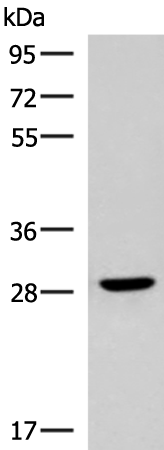
| WB | 咨询技术 | Human,Mouse,Rat |
| IF | 咨询技术 | Human,Mouse,Rat |
| IHC | 咨询技术 | Human,Mouse,Rat |
| ICC | 技术咨询 | Human,Mouse,Rat |
| FCM | 咨询技术 | Human,Mouse,Rat |
| Elisa | 1/5000-1/10000 | Human,Mouse,Rat |
| Aliases | CD370; DNGR1; DNGR-1; UNQ9341 |
| WB Predicted band size | 27 kDa |
| Host/Isotype | Rabbit IgG |
| Antibody Type | Primary antibody |
| Storage | Store at 4°C short term. Aliquot and store at -20°C long term. Avoid freeze/thaw cycles. |
| Species Reactivity | Human |
| Immunogen | Synthetic peptide of human CLEC9A |
| Formulation | Purified antibody in PBS with 0.05% sodium azide and 50% glycerol. |
+ +
以下是关于CLEC9A抗体的3篇代表性文献概览:
---
1. **文献名称**:*Identification of a dendritic cell receptor that couples sensing of necrosis to immunity*
**作者**:Sancho, D., et al.
**摘要**:该研究首次鉴定CLEC9A为特异性识别坏死细胞表面暴露的肌动蛋白丝(F-actin)的树突状细胞受体,并阐明其通过Syk激酶信号通路促进抗原交叉呈递,从而激活CD8+ T细胞抗肿瘤免疫应答。
2. **文献名称**:*Targeting antigen to mouse dendritic cells via Clec9A induces potent CD4 T cell responses biased toward a follicular helper phenotype*
**作者**:Caminschi, I., et al.
**摘要**:研究团队开发了针对CLEC9A的单克隆抗体(mAb),证明通过抗体将抗原靶向递送至CLEC9A+树突状细胞可显著增强滤泡辅助性T细胞(Tfh)分化及抗体产生,为疫苗设计提供新策略。
3. **文献名称**:*The structure of the C-type lectin receptor CLEC9A reveals a ligand binding surface with distinct charge and topology*
**作者**:Jégouzo, S.A., et al.
**摘要**:通过晶体结构解析,揭示了CLEC9A的C型凝集素结构域具有独特的电荷分布和拓扑结构,阐明了其与F-actin及特异性抗体结合的分子基础,为开发靶向CLEC9A的抗体药物提供结构指导。
---
**备注**:CLEC9A抗体研究多聚焦于其在肿瘤免疫治疗(如疫苗佐剂)或自身免疫疾病中的潜在应用,上述文献涵盖功能机制、抗体开发及结构解析三个关键方向。
CLEC9A (C-type lectin domain containing 9A), also known as DNGR-1. is a type II transmembrane protein belonging to the C-type lectin receptor family. It is primarily expressed on a subset of dendritic cells (DCs), particularly the CD8α⁺/CD103⁺ conventional DCs in mice and their equivalents in humans. Discovered in 2008. CLEC9A functions as a pattern recognition receptor that senses cytoskeletal filaments (e.g., F-actin) exposed upon cell necrosis, facilitating the uptake and cross-presentation of dead cell-associated antigens to CD8⁺ T cells. This unique role positions CLEC9A as a critical mediator in bridging innate and adaptive immunity, particularly in anti-tumor and antiviral responses.
CLEC9A antibodies are valuable tools for targeting DC subsets to enhance antigen-specific immune responses. They are often engineered as monoclonal antibodies (mAbs) or conjugated to antigens, vaccines, or therapeutic payloads (e.g., nanoparticles or fusion proteins) to direct cargo specifically to CLEC9A⁺ DCs. Preclinical studies highlight their potential in cancer immunotherapy, where CLEC9A-targeted strategies boost T cell priming and antitumor efficacy. Additionally, these antibodies aid in studying DC biology, including receptor trafficking, signaling, and antigen-processing pathways. Despite promise, challenges remain in optimizing specificity and minimizing off-target effects. Research continues to explore CLEC9A's structural interactions and therapeutic applications in vaccines, autoimmune diseases, and infectious diseases.
×